It was hardly a five-line report buried inconspicuously inside page 7 of a national daily, but nevertheless it caught my eye. That was early January this year. A tiger, the report stated, had emerged at a place hardly 19 kilometres from Lucknow, the capital of Uttar Pradesh and undoubtedly one of the most populous places in India. “Hey, what is this tiger doing so near Lucknow, and how did it reach here,’’ I questioned myself which brushing the newspaper aside. A freak phenomenon, I concluded.
Little did I know then that the issue would soon become one of the most discussed topics among environmentalists and wildlife lovers alike… And would trigger a big tiger-chase which, despite the efforts of dozens of forest officials, remains a chase: for the tiger still remains free. What is more, the wily big cat now shares limelight with top politicians of the country, and it exploits appear on page one of several newspapers almost on a daily basis!
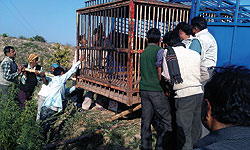 |
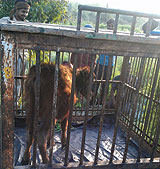 |
| A trap being set up for the tiger of Rehman Kheda |
A bait in the trap
|
But first thing first. The day I read about the tiger, our reporter and cameraman Piyush Sharma was sent to the spot… And what a spot it was! A village which goes by the name of Rehman Kheda. Situated on the outskirts of Lucknow, you will have to squint your eyes to spot the village on the map of Uttar Pradesh. We eventually found it to be a small, sleepy place. Of course there is this huge complex of Central Institute for Sub-Tropical Horticulture nearby, which gives some semblance of identity to Rehman Kheda…
But suddenly, one fine morning in the January of 2012, Rehman Kheda and the Central Institute shot to public attention. For, a wild tiger decided to arrive and make itself comfortable in the area!
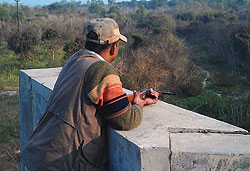 |
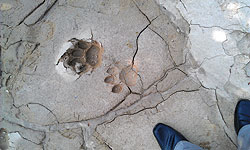 |
A forest official keeps a vigil inside the sprawling Central Institute complex... Just in case
|
The tiger's pug-mark on the dirt road leading to Rehman Kheda
|
It’s not every day that a tiger walks into habitation and starts living there… And that too so close to the political jungle of India’s most populous state! To be fair to the tiger, it has behaved exactly like the way the famous hunter and conservationist Jim Corbett envisioned it decades ago: A perfect gentleman… So far, this particular tiger has not harmed a single human being, or created scare of any kind…
In fact, the people of Rehman Kheda and some dozen odd villages in the vicinity seem to be of similar temperament. They do not mind the tiger in their midst!
Initially, there were doubts about the existence of tiger. But on the morning of January 18, it was finally spotted by the people of Rehman Kheda. The night before, they heard it roaring outside the village. On January 19, our reporter Piyush photographed the pug marks-proving without a shadow of doubt the existence of a tiger.
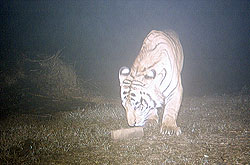 |
|
Thanks to the camera traps fixed in the premises, the tiger finally shows itself!
|
A ‘machan’ put up inside the complex, but all to no avail |
The tiger, it was discovered subsequently, would spend the day in the Central Institute complex. Hundreds of mango trees, bushes and a large patch of grass-land within the complex give ample hiding space to the tiger, and this is where it would spend better part of the day. At night, however, the tiger would come out of the complex and visit Rehman Kheda and other villagers… Its pugmarks, spread all over the fields, unmistakably revealed its lonely journeys. Meanwhile, the forest authorities of Uttar Pradesh initiated efforts to nab the wayward tiger. It is true that the big cat has not harmed a human so far, but it would be prudent not to take a chance.
The first thing the forest authorities did was set up traps at three places inside the central institute complex. To lure it near the contraptions, they even put up goats as baits. Additionally, a number of trap-cameras were placed in and around the campus to monitor the activities of elusive tiger.
Subsequent photographs gathered by trap cameras showed the tiger was hugely enjoying the hospitality being offered to it. It killed and ate all the goats, but decided to stay away from the traps… Now who says tigers are not smart?
The big question is- where did this tiger came from? Dudhwa National Park or the forests of Pilibhit region come naturally to mind. But what is not clear is why did it choose Rehman Kheda? According to some officials, the tiger could have lost its territory to a challenger—and hence was forced to move out and find a new territory. At best, however, this remains a hypothesis.
Whatever the reasons for the tiger’s sudden appearance and its obvious reluctance to leave the area, the forest department has mounted efforts to nab it. A team from Dehradun based Wildlife Institute of India is assisting the UP forest Department. It even got this tranquilising gun for the forest staff. But the tiger chose not to come within its range…
When neither the traps nor the tranquilising guns work, what does one do? Bring in the elephant, of course! A trained elephant has been brought specially from Dudhwa National Park to keep an eye on the tiger’s movement.
So far, the tiger has outwitted its pursuers. Life, too, goes on normally in Rehman Kheda. The funny thing is, nobody in the village seems to be too worked up about the tiger. My heart craves for a tryst with this new nawab of Lucknow, but my official engagements as CMD of Raheja Developers keeps me from going there immediately. And sitting in my New Delhi office, I often wonder what the tiger’s next move could be. I cannot help but think of William Blake’s immortal lines:
“When the stars threw down their spears, And water'd heaven with their tears, Did He smile His work to see? Did He who made the lamb make thee? Tiger, tiger, burning bright In the forests of the night, What immortal hand or eye, Dare frame thy fearful symmetry?’’
|